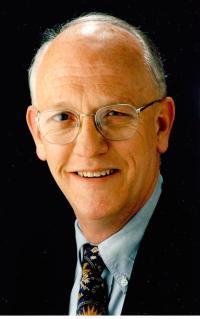Using Technology with a Fundamental Focus on the Patient
David H. Gustafson, Ph.D.
Professor and Researcher
University of Wisconsin–Madison

“AHRQ has always been open to letting us see if we can do the impossible.”
David H. Gustafson, Ph.D., has been conducting digital health research since before the term was coined. He was years ahead of the curve in collecting patient-reported outcomes data and putting them to use. He placed patients squarely at the center of his scientific inquiry decades earlier than the experts who later declared patient-centeredness to be a domain of health quality.
With a career spanning nearly 60 years, Dr. Gustafson, a professor and researcher at the University of Wisconsin–Madison, has been at the vanguard, devoting his life’s work to developing and implementing computer systems to help people confront a variety of serious health conditions. “I’ve never been interested in helping doctors or nurses, even though I have great respect for both professions,” Dr. Gustafson said. “My only interest has been in helping patients and their families.”
In 1963, while still an undergraduate, Dr. Gustafson undertook a fellowship in health administration and instantly was drawn to the systems issues the field presented. “The more I got into healthcare, the more frustrated I became with the challenges that people go through to try to get good care,” he recalls.
So, with a series of grants from AHRQ and its predecessors (the Agency for Health Care Policy and Research, or AHCPR, and, before that, the National Center for Health Services Research and Development), he set out to improve care, with the goal of making life better for patients.
His initial research project focused on suicide prevention. More than 50 years ago, after multiple suicides among psychiatric residents at Wisconsin, then-new faculty member Dr. Gustafson partnered with his colleague and mentor John Greist, M.D., and received a grant from the National Center for Health Services Research and Development to develop a system to estimate the probability that people would attempt suicide.
The system consisted of a computer-based interactive interview and a computerized decision-making model. “We found that people were more willing to talk to computers than they were to human beings,” he recalls. “We would interview people by computer, and we would shove that information into an old LINC-8 computer, and it would produce a prediction in the form of a narrative that would then be sent to the clinical team.”
Much later, in 1990, Dr. Gustafson received a 3-year grant from what was then AHCPR to develop what became one of his crowning achievements: the Comprehensive Health Enhancement Support System, or CHESS, a computer-based system to help people in crisis with up-to-date information, behavior change and decision tools, and other interactive features.
Initially, he applied CHESS to support treatment for HIV/AIDS patients. Working with colleagues at Wisconsin, he placed computers in patients’ homes for up to 6 months with the goal of providing information, emotional support, and decision support. It was successful right away; patients infected with HIV who used CHESS had fewer hospitalizations and reported higher quality of life.
In 1997, Dr. Gustafson received a 4-year grant from AHCPR to develop a CHESS module for treating patients with Alzheimer’s disease, which he and his colleagues later broadened to help support healthy aging. He since has applied CHESS and similar technologies to develop systems for patients battling addiction, cancer, and a variety of other health issues.
Dr. Gustafson received a 6-year AHRQ grant in 2011 to develop an easy-to-use, laptop-based system to support seniors with multiple chronic conditions. Elder Tree, a web-based platform, has tools for users to track their health and wellness, including resources such as Active Living Tips.
Then, in 2020, Dr. Gustafson received a 5-year AHRQ grant to modify the platform to make it even easier for older adults to use. His current project is testing Elder Tree’s adaptability to use voice activation, which will allow users to interact with it for hands-free requests and other simple tasks. This project will end July 31, 2025.
He remains grateful to AHRQ for its early and ongoing support. “The neat thing was that AHRQ has always been curious,” he says. “If I’d go to them and raise a new idea, they were always open to try new things. AHRQ has always been open to letting us see if we can do the impossible.”
Dr. Gustafson is still on the faculty at Wisconsin, where in 2020 an endowed chair was named in his honor. He is a member of the National Academy of Engineering and the American College of Medical Informatics. He is director of Wisconsin’s Center for Health Enhancement Systems Studies, which he founded in 2007. He was a co-founder of the Institute for Healthcare Improvement and is director of the National Program Office of the Network for Improvement of Addiction Treatment. He also founded the Center for Health Systems Research and Analysis, a multidisciplinary research center employing systems analysis, decision science, and decision support technologies to address patient care and health policy problems.
Principal Investigator: David H. Gustafson, Ph.D.
Institution: University of Wisconsin–Madison
Grantee Since: 1968
Type of Grant: Various
Related AHRQ Resources
Consistent with its mission, AHRQ provides a broad range of extramural research grants and contracts, research training, conference grants, and intramural research activities. AHRQ is committed to fostering the next generation of health services researchers who can focus on some of the most important challenges facing our Nation's health care system.
To learn more about AHRQ's Research Education and Training Programs, please visit https://www.ahrq.gov/training.



